| Presidents on Bottle Tops |
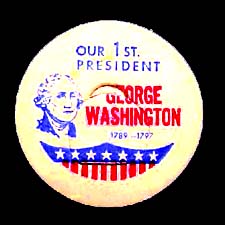
PRESIDENTS IN PORTSMOUTH
Neaerly a dozen Chief Executives have visited Portsmouth, NH, but it's all been downhill since George Washington's visit. Here is a rundown of the top dogs who came to town and what they did -- or didn't do -- in Seacoast, New Hampshire.
VISIT: Our Washington & Lear Section
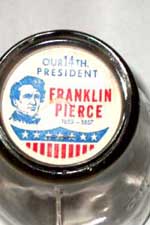 When I was a kid all the presidents came to town. They arrived on milk bottles. The bottles came from Magoon's Dairy in a wire basket carried by a classic 50s milkman with a flat-topped paramilitary hat and a white uniform. For a time the bottle caps carried pictures of the presidents, and of course, a boy's major goal in life was to collect all thirty-something images. Magoon's supplied a handy collector's wall chart with rows of empty white circles where I dutifully pasted the lids in place with Elmer's glue. Milk had cream in those days, and it was important to wash the back of the lids carefully or the whole chart built up a nasty sour smell.
When I was a kid all the presidents came to town. They arrived on milk bottles. The bottles came from Magoon's Dairy in a wire basket carried by a classic 50s milkman with a flat-topped paramilitary hat and a white uniform. For a time the bottle caps carried pictures of the presidents, and of course, a boy's major goal in life was to collect all thirty-something images. Magoon's supplied a handy collector's wall chart with rows of empty white circles where I dutifully pasted the lids in place with Elmer's glue. Milk had cream in those days, and it was important to wash the back of the lids carefully or the whole chart built up a nasty sour smell.
I already knew the money-presidents, the ones on coins and bills, but this was my first exposure to the likes of Zachery Taylor, Martin Van Buren and Millard Filmore. Later I had all the names on a plastic pencil box with a dial that showed the states and capitals. One year we were required to memorize all the president's names, in order. You got an extra gold star if you could recite them backwards too.
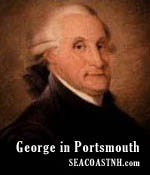 Back then, to us little kids, President Eisenhower was a god. There was a Boston kids show on TV called "Big Brother" Bob Emery that I watched religiously. Each day Brother Bob would tell us to go into the kitchen and make a big glass of Ovaltine, which I did, and bring it back to the TV set. Then, to a recording of "Hail to the Chief", we'd chug down the flavored milk as the camera focused for half an eternity on a portrait of President Ike. There was no humor, no irony, no commercialism in this daily ritual. It was just what good American boys and girls did. If Magoon's had a cut of the milk action, I don't want to know. Anyone who could make it on to a milk bottle cap or a baseball card was hero enough for me.
Back then, to us little kids, President Eisenhower was a god. There was a Boston kids show on TV called "Big Brother" Bob Emery that I watched religiously. Each day Brother Bob would tell us to go into the kitchen and make a big glass of Ovaltine, which I did, and bring it back to the TV set. Then, to a recording of "Hail to the Chief", we'd chug down the flavored milk as the camera focused for half an eternity on a portrait of President Ike. There was no humor, no irony, no commercialism in this daily ritual. It was just what good American boys and girls did. If Magoon's had a cut of the milk action, I don't want to know. Anyone who could make it on to a milk bottle cap or a baseball card was hero enough for me.
I have lived, so far, under 11 of our 43 chief executives, which tells me, not that I am old, but that our country is still astonishingly young. I remember my 11 presidents well, but despite all that youthful indoctrination -- the early ones remain hazy and out of reach. So it was a great pleasure, this President's Day to rediscover local historian Ray Brighton's book "Rambles About Portsmouth." In one chapter Brighton tracks all the early presidents who visited Portsmouth in the flesh. This is what I learned.
Technically, it's all been downhill since George Washington spent four whole days here in 1789. Washington was treated like a god. Streets were renamed. The population sang his praises, trailed him about town, treated him to a dance in which he admired the attractive women of the city. He attended two church services, had tea at John Langdon's mansion and took a fishing trip to Kittery. Around here we've heard that story a hundred times. No sitting president has stayed so long in town since.
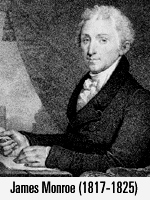 Only six presidents made their way to Portsmouth in the next 100 years. By the time James Monroe arrived in 1817, the American dream was already frayed at the edges. War with Britain and the resulting trade embargoes had savaged the local economy. What remained had been burned up in a series of devastating downtown fires. Many promising young leaders, Daniel Webster among them, had split town for greener pastures.
Only six presidents made their way to Portsmouth in the next 100 years. By the time James Monroe arrived in 1817, the American dream was already frayed at the edges. War with Britain and the resulting trade embargoes had savaged the local economy. What remained had been burned up in a series of devastating downtown fires. Many promising young leaders, Daniel Webster among them, had split town for greener pastures.
Monroe, who had been an aid to Washington in the Revolution, was treated to a duplicate visit -- same parade, same songs sung in the streets, same tea with John Langdon, same church services. Monroe also toured the Kittery area and caught sight of the new economic hope of the region, Portsmouth Naval Shipyard. The message of the broken city to the president was as simple as a prayer -- Save us! -- they begged.
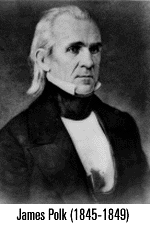 Thirty years and five presidents passed before James Polk, the youngest president to date, arrived in 1847. America had changed almost beyond belief as this Tennessee protégé of Andrew Jackson pushed the country west toward Texas and California.
Thirty years and five presidents passed before James Polk, the youngest president to date, arrived in 1847. America had changed almost beyond belief as this Tennessee protégé of Andrew Jackson pushed the country west toward Texas and California.
Always respectful, anti-Polk, anti-slavery, anti-war townspeople did not repeat their Washington tribute. When city officials postponed Fourth of July fireworks one day to accommodate the president's visit -- a small memorable insurrection took place. A group of mischievous boys rolled an old stage coach into Market Square and set it on fire. Among them was young Thomas Bailey Aldrich, the Portsmouth poet, who confessed all in his bestseller "Story of a Bad Boy."
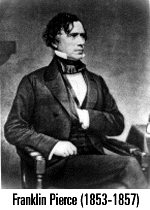 Franklin Pierce arrived next in 1856. Despite his friendship with Bowdoin classmate Nathaniel Hawthorne, the 14th chief executive ran with this horrific slogan: "We Polked You in 1844, We Shall Pierce You in 1852." New Hampshire's only native-born president, Pierce was on home turf having served his legal apprenticeship in Portsmouth. Largely unpopular and later blamed for helping ignite the Civil War, Pierce requested a low-key visit from local officials. They settled for a 21-gun salute, a little speechmaking, and a visit to Fort Constitution for the launching of a new ship. Afterwards, accompanied by James Buchanan, who would be the next US president, Pierce retired to the Rockingham House to hang out with old friends. Ironically, with the nation on the edge of civil war, Pierce and his wife found peace in Portsmouth. They returned for a short visit when the president's single term ended the next year, and stayed many months.
Franklin Pierce arrived next in 1856. Despite his friendship with Bowdoin classmate Nathaniel Hawthorne, the 14th chief executive ran with this horrific slogan: "We Polked You in 1844, We Shall Pierce You in 1852." New Hampshire's only native-born president, Pierce was on home turf having served his legal apprenticeship in Portsmouth. Largely unpopular and later blamed for helping ignite the Civil War, Pierce requested a low-key visit from local officials. They settled for a 21-gun salute, a little speechmaking, and a visit to Fort Constitution for the launching of a new ship. Afterwards, accompanied by James Buchanan, who would be the next US president, Pierce retired to the Rockingham House to hang out with old friends. Ironically, with the nation on the edge of civil war, Pierce and his wife found peace in Portsmouth. They returned for a short visit when the president's single term ended the next year, and stayed many months.
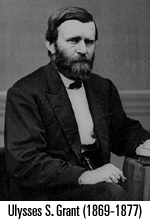 Abraham Lincoln campaigned in nearby Dover and visited Exeter where his son was at the Academy, but seems to have missed Portsmouth. Lincoln's murder just moments after the end of the Civil War changed the nation and the presidency. Who could live up to the image of the martyred saint who had, in words at least, emancipated the slaves and re-united the country? Certainly not President Ulysses S. Grant whose Reconstructionist era was scarred with scandal. During his 1871 whistle-stop visit to Portsmouth Grant was accompanied by no less than 200 colleagues and cronies in a luxurious new Pullman car decked out in garlands of flowers.
Abraham Lincoln campaigned in nearby Dover and visited Exeter where his son was at the Academy, but seems to have missed Portsmouth. Lincoln's murder just moments after the end of the Civil War changed the nation and the presidency. Who could live up to the image of the martyred saint who had, in words at least, emancipated the slaves and re-united the country? Certainly not President Ulysses S. Grant whose Reconstructionist era was scarred with scandal. During his 1871 whistle-stop visit to Portsmouth Grant was accompanied by no less than 200 colleagues and cronies in a luxurious new Pullman car decked out in garlands of flowers.
The resulting war of words in the Portsmouth newspapers led to this fascinating passage in the Portsmouth Times. It is a sentiment more worthy of a classic William Loeb editorial in the Manchester Union Leader:
"However unworthy of respect and veneration U.S. Grant may be as a man, we are sorry that any should fail to pay proper respect to the President of the United States. Hence we regret that any persons were provoked by his stupid appearance as he stood on the platform of the car at the depot, to make insulting remarks in his hearing. If Grant does look as though he had been drunk for a week, and act, in a surly, cold and indifferent manner toward the people who throng to see him, still it is wrong to treat him as other men should be treated for such conduct. Remember that he is president, and properly regard his high office."
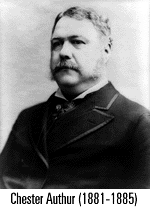 Whew! Try to imagine the local daily getting away with that under Homeland Security today. No wonder President Chester A. Arthur's visit in 1882 was a closed-door affair. This was the influential era of Portsmouth ale tycoon Frank Jones who owned half the city. Jones had been at political odds with President Garfield, but had earlier served in Congress with Arthur, his vice president. When Garfield was assassinated in 1881, Jones wasted no time in extending an invitation to his former colleague.
Whew! Try to imagine the local daily getting away with that under Homeland Security today. No wonder President Chester A. Arthur's visit in 1882 was a closed-door affair. This was the influential era of Portsmouth ale tycoon Frank Jones who owned half the city. Jones had been at political odds with President Garfield, but had earlier served in Congress with Arthur, his vice president. When Garfield was assassinated in 1881, Jones wasted no time in extending an invitation to his former colleague.
President Arthur was only too happy to enjoy free accommodations at Jones' luxurious Wentworth-by-the-Sea hotel in New Castle and the Rockingham Hotel in Portsmouth. Arthur arrived in September 1882 on the USS Dispatch and, in his biography of Jones, historian Brighton suggests that the two power-brokers cut a deal to stall the possible closure of the Portsmouth Navy Yard. If so, it worked, since the Navy Yard survived to enjoy its 200th anniversary and more. When the President noted that he would like to build a cottage in the area, Jones immediately offered to pay for the land. Reak estate deas were much less formal in the days before Whitewater.
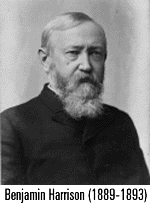 By contrast, the last Portsmouth presidential visit of the 19th century in 1889 was a highly public affair. That's odd, since President Benjamin Harrison was known as "Kid-Glove Harrison" for his penchant for wearing gloves to avoid infection while shaking hands with the public. Harrison's great-grandfather had signed the Declaration, and his grandfather was the least effective and most forgettable of all American presidents. That's because poor William Henry Harrison caught cold during his inauguration in 1841 and died 30 days later.
By contrast, the last Portsmouth presidential visit of the 19th century in 1889 was a highly public affair. That's odd, since President Benjamin Harrison was known as "Kid-Glove Harrison" for his penchant for wearing gloves to avoid infection while shaking hands with the public. Harrison's great-grandfather had signed the Declaration, and his grandfather was the least effective and most forgettable of all American presidents. That's because poor William Henry Harrison caught cold during his inauguration in 1841 and died 30 days later.
According to local newspapers, a crushing throng of men and women filled the Portsmouth depot as President Harrison arrived in his fancy train car en route from his vacation in Bar Harbor. Citizens hoping for appointed public offices waved resumes in hopes of attracting the favor of the chief executive. Twelve minutes and one short speech later, the president was heading down the tracks toward Manchester.
According to historian Ray Brighton, the whistle stop tradition continued through the 20th century. - Taft, Franklin Roosevelt, Truman, Ford, Carter all came. President George Bush used Pease Air Force Base like a private landing strip on frequent visits to his "summer White House" in nearby Kennebunkport. There was Bill Conton, of course. Then came two-term President George Walker Bush, who continued his dad’s tradition of flying into Portsmouth on the way to the family compound at Walker Point in Maine. That’s 14 chief executives by my rough count.
I don't know what happened to those milk bottle tops. They went the way of the milkman, I guess. Heroes are for kids, anyway. We all grow up and learn the truth about politics. I know George Washington didn't chop down that cherry tree or throw that silver dollar across the Piscataqua. I remember getting my final bottle top and completing the whole set in 1960, the year our family moved from Massachusetts to New Hampshire. Everything was new and exciting and possible. The new president was a guy named Kennedy. Perhaps you remember him too.
Copyright (c) 2005 by J. Dennis Robinson. Originally published here in 2000.
